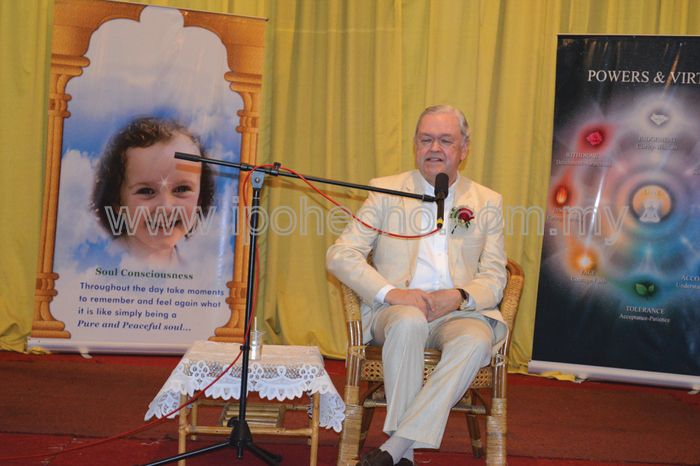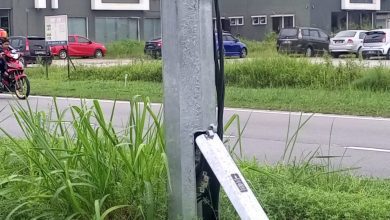

Cover Story
By A. Jeyaraj
Ipoh Echo had published cover stories on major religions and their places of worship in past issues and in this issue we are covering less known religions and spiritual organisations, in order that we can do justice to the myriad ways in which Ipohites choose to worship. Some groups refused to grant us interviews preferring to remain in the background while others were forthcoming and welcomed our questions and visits.


Practices may vary but all share in service to humanity and leading moral and spiritual lives.
Jainism
Shree Cintamani Parshvanath Jinalaya Temple in First Garden is the only Jain Temple in Southeast Asia. Bharath Jassani, Trustee of the temple, informed that there are about 10 Jain families in Ipoh and about 200 families in Malaysia. The Jain population in Ipoh is about 50. The temple was built in 2002.
Jainism is an ancient religion from India that teaches the way to liberation and bliss is to live a life of harmlessness and renunciation. The aim of a Jain life is to achieve liberation of the soul.


The main festival of the temple is Paryushana which is celebrated for nine days during August/September. Paryushana means “abiding and coming together”. It is a time when sravakas or lay people take on vows of study and fasting. They pray and meditate to increase their level of spiritual intensity. There are no set rules, and followers are encouraged to practise according to their ability and desires. The festival ends with the celebration of Kshamavani or forgiveness day, where everyone asks for forgiveness from each other.
The temple celebrated its 15th anniversary grandly during February and about 500 devotees participated in the two-day event. Shree Siddha Chakra Maha Poojan and Shree Siddha Chakra Yantra, two of the most auspicious pujas or prayers were conducted.
The temple is normally closed and devotees inform Bharath of their visit and the temple will then be opened for them.
Address: 15 Persiaran Bekor 4, First Garden, 30100 Ipoh. Contact: Bharat, 016 557 4007.
International Society for Krishna Consciousness
The International Society for Krishna Consciousness (ISKCON), also known as ‘the Hare Krishna’ movement, was founded in 1966 in New York City by A.C. Bhaktivedanta Swami Prabhupada. It is classified as a new religious movement and its core philosophy is based on scriptures such as the Bhagavad-Gita and Srimad Bhagavatam, both of which date back more than two millennia.
Non-sectarian in its ideals, ISKCON was formed to spread the practice of ‘Bhakti yoga’ (Yoga of Devotion); wherein aspirant devotees dedicate their thoughts and actions towards pleasing Supreme Lord, Krishna.




Para Brahma Das, Temple Chairman Ipoh Branch, said that about 40 families actively participate in the celebrations of the temple. The core activity is to teach, train and disseminate philosophy as presented in Bhagavad-gita. Classes are conducted every Sunday for children and adults and about 40 people attend.
Once a month devotees visit schools and give talks on morality and spirituality and provide meals.
The main festival is Jaganath Ratha Yathra celebrated in September. The festival includes Bharartha Natyam (cultural dance), bajans (religious songs), talks and exhibition. At night there is a chariot procession.
ISKCON runs Hare Krishna Food for Life Centre in Buntong. Free vegetarian lunch is served daily except on Sundays.
Address: 15H, Jalan Lang, Rifle Range, 30000 Ipoh. Contact: Para Brahma Das, 019 982 6720.
Baha’i Faith
The Baha’i Faith is a monotheistic religion which emphasises the spiritual unity of all humankind. Three core principles form the basis for Baha’i teachings and doctrine: the unity of God which states that there is only one God who is the source of all creation; the unity of religion, that all religions have the same spiritual source and come from the same God; and the unity of humanity, that all humans have been created equal, coupled with the unity in diversity. According to the Baha’i Faith’s teachings, the human purpose is to learn to know and to love God through such methods as prayer, reflection, and being of service to humanity. The Baha’i Faith was founded by Bahá’u’lláh in 19th-century Persia.


V. Vijayasekaran, Chairman of Spiritual Assembly, said that Baha’ism has a nine-member council at national and state levels. In Ipoh there are about 300 followers of the faith. They do not have a temple in Ipoh and meet at Baha’i centres.


The Baha’i calendar, called the Badí’ calendar (badí’ means wondrous or unique), is a solar calendar with years composed of 19 months of 19 days each (361 days) plus an extra period of “intercalary days” (inserted in the calendar to make the calendar year correspond to the solar year)
The Nineteen-Day Fast is a nineteen-day period of the year, during which members of the Baha’i Faith adhere to a sunrise-to-sunset fast. The fasting is done during the month of February and their new year Naw-Ruz or New Day is celebrated in March after the fast.
For further information call Vijaya Segaran, 012 523 6097.
Brahma Kumaris
The aim of Brahma Kumaris is to serve the public by teaching meditation and to impart moral and ethical knowledge. Their commitment is to help individuals transform their perspective of the world from material to spiritual. It supports the cultivation of a deep collective consciousness of peace and the individual dignity of each soul. Brahma Kumaris is the largest spiritual organisation in the world led by women.
It was founded in 1937 in India by Brahma Baba, formerly known as Dada Lekhraj Kripalani, who had a series of visions depicting world transformation.


Brahma Kumaris Malaysia was established in 1981 and courses on meditation and living skills are offered free of charge as a service to the community. They regularly organise lectures, exhibitions, workshops and seminars on topics related to self-development, positive thinking, stress management, values education, self-management and leadership training.
V. Revathy, Centre Co-ordinator, said that about a hundred people attend their functions regularly. They conduct a seven-day preliminary introductory course about their teachings for those interested in joining the group.
Public talks are organised when local and foreign speakers are available. Many people have benefited in terms of building character, regaining peace of mind, increasing concentration power and enhancing self-confidence.
Their next event, ‘Simple Living High Thinking’, will be held on May 2 from 6.30pm to 9pm at Tower Regency Hotel (see the announcement on page 12).
Address: 1 Persiaran Kin Mee, Taman Kin Mee, 31400 Ipoh. Contact: Revathy, 017 557 5770.
Sahaja Yoga
Sahaja Yoga is a method of meditation which brings a breakthrough in the evolution of human awareness. It was created by Shri Mataji Nirmala Devi in 1970 and has since spread all around the world.
In Shri Mataji’s own words: “Global unity of mankind can be achieved through this awakening that can occur within each human being, so that transformation takes place within us. By this process a person becomes moral, united, integrated and balanced. ‘Know thyself’ is the main theme of all the scriptures – it becomes evident and one reaches the absolute understanding of oneself.”


Sahaja Yoga is not only the name of the movement, but also the technique the movement teaches and the state of awareness achieved by the technique. The movement teaches the belief that self-realisation through kundalini awakening is a transformation which can be experienced in the central nervous system and results in a more moral, united, integrated and balanced personality.
Lau Kai Leong, spokesman for Sahaja Yoga said that the group was started in Ipoh during the mid-nineties and there are about 30 members.
Lau said that they conduct free yoga meditation classes on Sundays for newcomers. The course runs for 18 Sundays. Upon completion of the course, members can attend collective meditation practice every Saturday.
Lau said that last year they gave self-realisation (SR) talks to students in Tamil Schools and this year are planning to give talks to students in Chinese schools. They set up booths during Wesak and Thaipusam and inform visitors of their practice.
Address: 58A, Lebuh Bercham Selatan, Taman Desa Bercham, 31400 Ipoh. Contact: Ms Christine, 016 565 9998.

